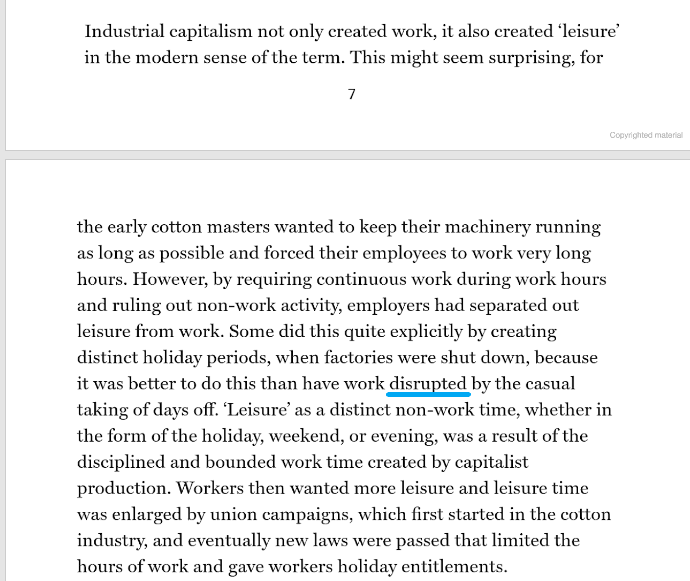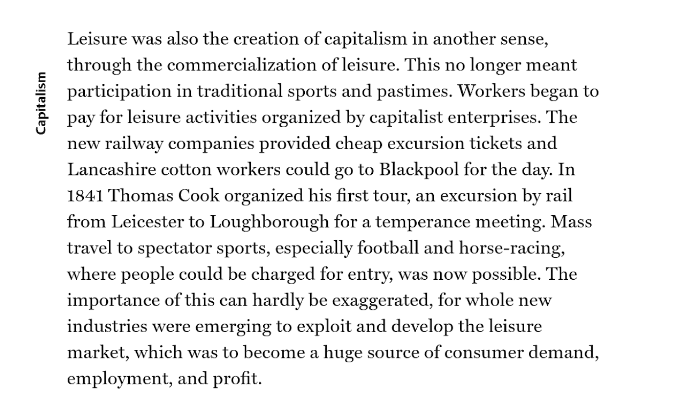2019학년도 수능 영어
[41~42] 다음 글을 읽고, 물음에 답하시오.
Industrial capitalism not only created work, it also created ‘leisure’ in the modern sense of the term. This might seem surprising, for the early cotton masters wanted to keep their machinery running as long as possible and forced their employees to work very long hours. However, by requiring continuous work during work hours and ruling out non-work activity, employers had (a) separated out leisure from work. Some did this quite explicitly by creating distinct holiday periods, when factories were shut down, because it was better to do this than have work (b) promoted by the casual taking of days off.
‘Leisure’ as a distinct non-work time, whether in the form of the holiday, weekend, or evening, was a result of the disciplined and bounded work time created by capitalist production. Workers then wanted more leisure and leisure time was enlarged by union campaigns, which first started in the cotton industry, and eventually new laws were passed that (c) limited the hours of work and gave workers holiday entitlements. Leisure was also the creation of capitalism in another sense, through the commercialization of leisure. This no longer meant participation in traditional sports and pastimes. Workers began to (d) pay for leisure activities organized by capitalist enterprises. Mass travel to spectator sports, especially football and horse-racing, where people could be charged for entry, was now possible. The importance of this can hardly be exaggerated, for whole new industries were emerging to exploit and (e) develop the leisure market, which was to become a huge source of consumer demand, employment, and profit.
* discipline: 통제하다 ** enterprise: 기업(체)
*** exaggerate: 과장하다
41. 윗글의 제목으로 가장 적절한 것은?
① What It Takes to Satisfy Workers
② Why Workers Have Struggled for More Leisure
③ The Birth and Evolution of Leisure in Capitalism
④ How to Strike a Balance Between Work and Leisure
⑤ The Light and Dark Sides of the Modern Leisure Industry
42. 밑줄 친 (a)~(e) 중에서 문맥상 낱말의 쓰임이 적절하지 않은 것은? [3점]
① (a) ② (b) ③ (c) ④ (d) ⑤ (e)
문제 푸는 순서
1
제목:
잘 쓰인 글이면, 첫 부분의 중요도 90%, 중간 부분 5%, 마지막 부분 5%
문맥-단어: 제목 찾을 때, (a)~(e)가 포함되면, 같이 풀어야 합니다.
2
3
제목:
잘 쓰인 글은 글의 첫 부분에 main idea가 있습니다. 글 전체에서 이 첫 부분이 차지하는 중요도는 90% 정도 됩니다.
중간 부분에서는 main idea를 설명합니다. Supporting ideas라고 합니다. 여러 개의 문장으로 구성됩니다.
설명을 길게 했으니, 마지막 부분에서는 이 설명을 정리합니다.
문맥-단어:
제목 찾을 때, (a)~(e)가 포함되면, 같이 풀어야 합니다.
모든 흐름과 관련된 문제는 앞 문장, 해당 문장, 뒤 문장이 매끄럽게 연결되도록 하는 것이 핵심입니다.
이야기가 매끄럽게 흘러가다가 갑자기 엉뚱한 말이 나오는 것을 찾으면 되는 쉬운 문제입니다. 처음부터 끝까지 읽어가며 찾으면 됩니다.
Main idea가 있는 첫 문장이 가장 중요합니다. 각 문단의 첫 문장을 합치면, ③이 답이 됩니다.
첫 문단은 industrial capitalism이 leisure를 만들어냈다. 두 번째 문단은 leisure가 또다시 created by capitalist production이라고 말하면서 holiday, weekend, or evening의 형태(=evolution)가 있다고 합니다.
낱말의 쓰임이 적절하지 않은 것:
(A) 노동자들에게 일을 많이 시키기 위해 고용주들은 여가를 일에서 분리했다.
(B) 공장이 쉴 때가 더 낫다 공장이 돌아가는 중에 casual days off로 인해 일이 장려되는 것보다.
(C) 결국 새로운 법이 통과되어 업무 시간이 제한되었다.
(D) 노동자들은 여가 활동에 대한 비용을 지불하기 시작했다.
(E) 여가 시장을 개발하기 위해 완전히 새로운 산업이 출현하고 있었다.
(B) 장려되는: promoted 중단되는: disrupted으로 바꿔야 합니다.
원문에는 어떻게 적혀 있는지 비교해보면 재미있겠죠?
Author: James Fulcher is Senior Lecturer in Sociology at the University of Leicester.
영국 영어입니다.
Review 1 2 3 4 5 6 7 8 9 10 11 12 13 14 15 16~17 해설 18 해설 19 출처 20 출처 21 출처 22 출처 23 출처 24 해설 25 해설 26 해설 27 해설 28 출처 29 출처 30 출처 31 출처 32 출처 33 출처 34 출처 35 출처 36 해설: 37 출처 38 출처 39 출처 40 출처 41~42 출처 43~45
연도별 수능 문제 (전체)
2026학년도 수능 2025학년도 수능 2024학년도 수능 2023학년도 수능 2022학년도 수능 2021학년도 수능 2020학년도 수능 2019학년도 수능 2018학년도 수능 2017학년도 수능 2016학년도 수능 2015학년도 수능 2014학년도 수능 2013학년도 수능 2012학년도 수능 2011학년도 수능 2010학년도 수능
2023.9 모의평가 2023.6 모의평가 2020.6 모의평가 2019.9. 모의평가 2019.6. 모의평가 2016.9. 모의평가 2016.6. 모의평가


